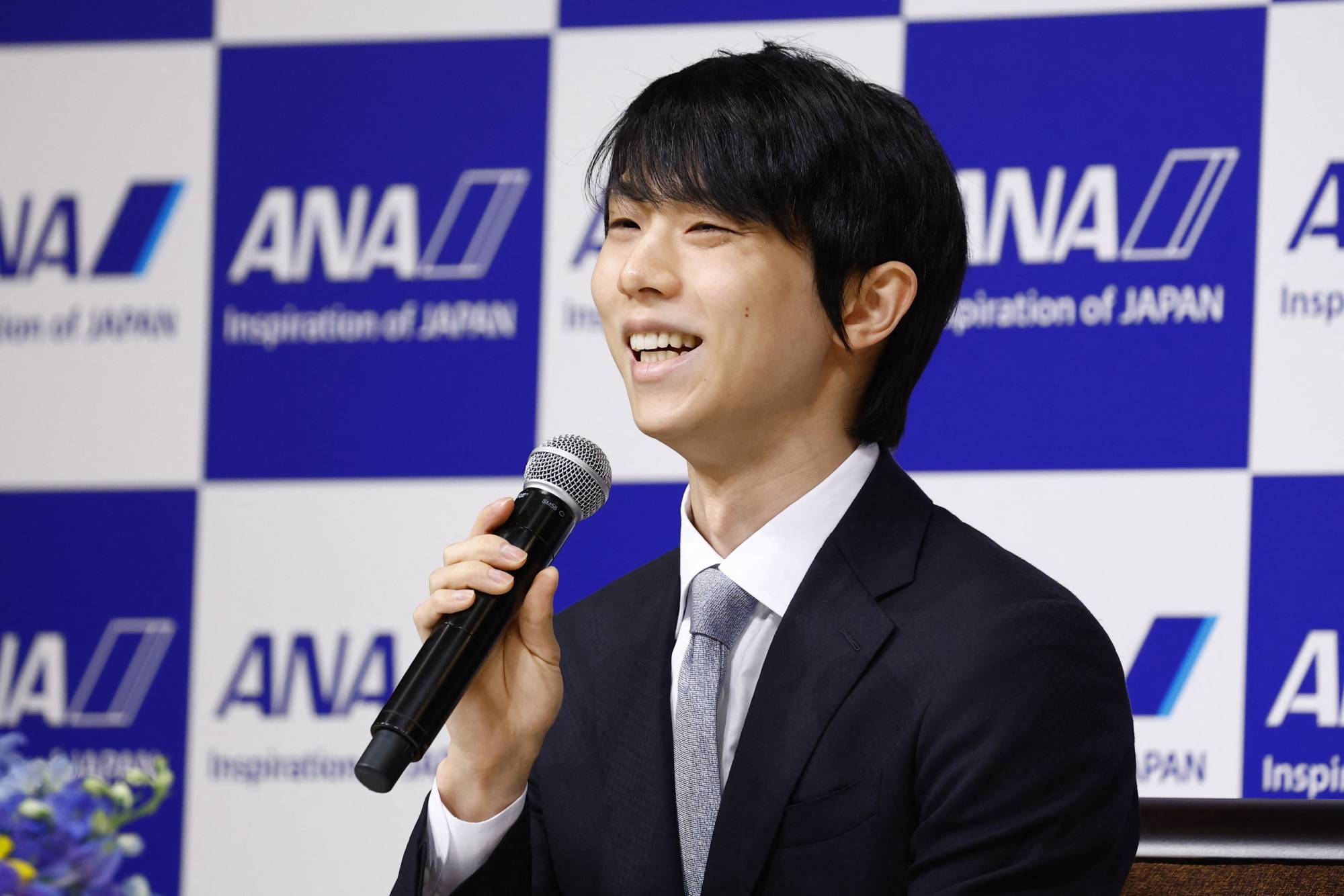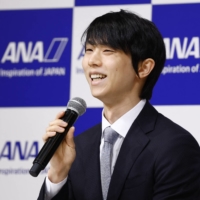Two-time Olympic gold medalist Yuzuru Hanyu announced his retirement on Tuesday, bringing to an end a 12-year senior career that saw him gain worldwide acclaim as the greatest male figure skater in history.
With programs that paired gravity-defying jumps with graceful athleticism, intricate costuming and emotional interpretations of Japanese culture, Hanyu was a driving force behind the sport’s boom in popularity as he inspired his peers and juniors to push the envelope in their own performances.
At a news conference in Tokyo, the 27-year-old revealed his decision to no longer compete, but continue to skate in exhibitions, ending months of speculation over whether he would contest the upcoming ISU Grand Prix season and begin a quest for a potential fourth Winter Games berth, despite a series of injuries that have hampered his results in recent years.
“I’m blessed to have had so many people support and recognize me,” Hanyu said. “Now instead of only at competitions, I hope there will be more opportunities to show off my skating, and I’m looking forward to creating those opportunities.”
Questions surrounding Hanyu’s future had only grown in volume since the Beijing Winter Olympics in February, where he finished fourth behind compatriots Shoma Uno and Yuma Kagiyama, as well as American gold medalist Nathan Chen.
Needing an unprecedented comeback after a shocking eighth-place finish in the short program, Hanyu declared that he would attempt a quad axel — figure skating’s most difficult jump and his ultimate brass ring — in the free skate.
In front of a rapt crowd at Capital Indoor Arena on Feb. 10, Hanyu — skating to Isao Tomita’s “Ten to Chi To” — leapt into the air and appeared close to completing the required 4½ rotations, only to fall to the ice during his landing as gasps echoed throughout the venue.
The quad axel attempt was nevertheless recognized by judges as the closest yet to a success in competition — the latest of countless new entries Hanyu has provided to the sport’s history books.
“The axel was as close as I’ve ever gotten before, and I think that’s the best that I can do right now,” Hanyu said afterward. “I went for it, and it’s something I’ll cherish forever.”
Days after the competition, Hanyu revealed that he had skated despite spraining his problematic right ankle in practice, admitting that he received an injection of painkillers shortly before taking to the ice.
He endured several more doses of painkillers in order to skate in the Feb. 20 exhibition gala — dancing with Beijing Olympics mascot Bing Dwen Dwen, to the delight of attendees — but would later cite his ankle sprain in withdrawing from March’s world championships in Montpellier, France.
Hanyu recovered from the injury in time to participate in the “Fantasy on Ice” show, which held 12 sold-out performances across four cities in May and June. Though he had indicated in comments published on the Japan Skating Federation’s website that he would “aim even higher” in the upcoming season, Hanyu had not publicly declared that he would compete.
“The ‘Fantasy on Ice’ show was the last time I’ll skate as an amateur, but it made me think that I want to perform on even bigger stages,” Hanyu said Tuesday.
“I want to increase my efforts on the quad axel and work hard to complete it in front of everyone. ... I hope everyone will continue to support me in my efforts.”
According to Nikkan Sports, Tuesday’s news conference was intended to take place last week, only to be postponed following the July 8 assassination of former Prime Minister Shinzo Abe — who in 2018 made Hanyu the youngest-ever individual recipient of the People's Honor Award.
Devoted fan base
Hanyu’s global following of millions of fans — known popularly as “Fanyus” — are known for their singular dedication to the skater and can often be seen flooding social media platforms such as Twitter and Tumblr with posts supporting him during competition season, including original art and poetry. His crossover appeal, which has drawn fans from the sporting and pop cultural worlds, has often been compared to that of K-pop megastars BTS.
“The thing that sets him apart from other skaters is his skill, but (also) in terms of popular cultural cachet — the fact that he plays with popular culture in his performances, and (that) his routines tend to be very stylized,” fandom studies expert Lori Morimoto told The Japan Times in January.
“He's very pretty in his routine, the costume is very pretty ... he sort of plays up the pretty, he doesn’t have a problem going there in a way that I think a lot of skaters sort of eschew.”
If there is a symbol of Hanyu’s fame, it is his trademark “Winnie the Pooh” tissue box, which has inspired fans to throw hundreds of stuffed toys representing the popular Disney character — which have later been donated to local hospitals and orphanages — onto the ice following each of his performances.
But the showers of toys — which sometimes presented a challenge for flower girls tasked with collecting presents from the ice during competitions — have not been seen since the start of the coronavirus pandemic due to infection-prevention measures taken at arenas worldwide.
Born in Sendai on Dec. 7, 1994, Hanyu took up skating at the age of 4 and made his junior international debut in 2008. He won that year’s Japan Junior Championships at just 13 years old, qualifying for the 2009 World Junior Championships.
He made his senior international debut in the 2010-11 season, taking bronze at his world championship debut in March 2012. Soon after, he joined the stable of legendary Canadian coach Brian Orser, eventually relocating his training base to Toronto — though he never forgot his Miyagi Prefecture roots, participating in charity shows and other initiatives to support the region following the Great East Japan Earthquake of 2011.
Hanyu’s era of competitive dominance included four straight Grand Prix Final golds between 2013 and 2016, as well as two world championship titles in 2014 and 2017.
But it was his Olympic performances, the first of which took place at the 2014 Winter Games in Sochi, Russia, that turned him into a global icon. There, Hanyu became the first male skater to break the 100-point barrier in the short program with his score of 101.45, before holding off Canada’s Patrick Chan in the free skate to become Japan’s first gold medalist in the men’s event.

Hanyu’s heroics continued four years later at the 2018 Pyeongchang Olympics, where he competed despite having missed the 2017 Grand Prix final as well as Japan’s domestic championships due to a lingering right angle injury.
Though he had not resumed training until January, Hanyu arrived in South Korea shortly before the men’s singles event, where he delivered a stunning 111.68-point short program — followed by a 206.17-point free skate to his signature “Seimei” — to become the first male skater to defend his gold medal since Dick Button at the 1952 Oslo Games.
“The Olympics have allowed me to be here today; they created a place that allowed me to express myself,” Hanyu said. “I didn’t succeed in my challenge in Beijing, but it was a place where I proved how I did my best to chase my dream.
“I’m happy it inspired those who watched me to move forward, if only a little.”
American skater Chen, who finished fifth in Pyeongchang but has gotten the better of Hanyu in recent seasons, has unabashedly declared Hanyu to be “the greatest of all time,” saying he’s enjoyed the chances he has had to take on the Japanese superstar.
“The opportunity to be able to share the ice with a guy like that, someone I’ve looked up to for a long time, someone that I’ve watched grow up through the junior ranks when I was a baby. ... It’s really cool to even just be able to see him in person,” Chen told Olympics.com before the Beijing Games.
In all, Hanyu set or broke a total of 19 world records, including seven after the current scoring system debuted in the 2018-19 season, and achieved a career “Super Slam” by winning at the 2020 Four Continents Championships in Seoul. Though he has since lost his world records under the new system to Chen, Hanyu remains Japan’s top skater, under current and historical scoring systems, in all three competition segments.
“He’s one of those figures in sports that just transcends being an athlete; there’s a combination of athleticism, drive and charisma to him that made people fall in love with not just his skating but also him as a person,” figure skating writer Jackie Wong told The Japan Times. “And for me, his whole persona grew exponentially every single time he put down another feat and another record in the sport."
Hanyu’s departure from competitive figure skating will create a power vacuum the likes of which the sport has never before experienced, at a time when Chen — the current world No. 1 — is taking time away from the rink to focus on his studies at Yale University, where he is expected to graduate in 2024.
Meanwhile, 19-year-old Kagiyama is beginning to emerge as the leader of a new generation of Japanese talent that will be expected to contend for a gold medal at the 2026 Winter Games in Milan-Cortina as Hanyu continues to skate down his own path.
“The figure skating I’ve enjoyed most was the kind I watched when I aspired to be a skater,” Hanyu said. “Whether or not I’ve achieved that, I can’t make that evaluation. But that’s the kind of performance I want to create.
“The rules have been changing a little every year, and they may continue to change, but I want to continue chasing my ideal.”
While Hanyu will no longer pursue a successful quad axel in competition, it may not be long before someone manages the feat, which was once thought impossible. Footage of 17-year-old Ilia Malinin landing the jump in practice went viral in May, and the American — whose Instagram handle is “quadg0d” — landed the jump while warming up in front of Japanese fans before a July 1 ice show in Yokohama.
“(Hanyu’s) retirement really turns the page and opens up a new chapter in men’s skating, especially in Japan,” Wong said. “But his retirement will also amplify his influence on the current and next generation of skaters; a lot of them grew up idolizing Hanyu.
“His style and presence will be felt for decades to come.”


















With your current subscription plan you can comment on stories. However, before writing your first comment, please create a display name in the Profile section of your subscriber account page.